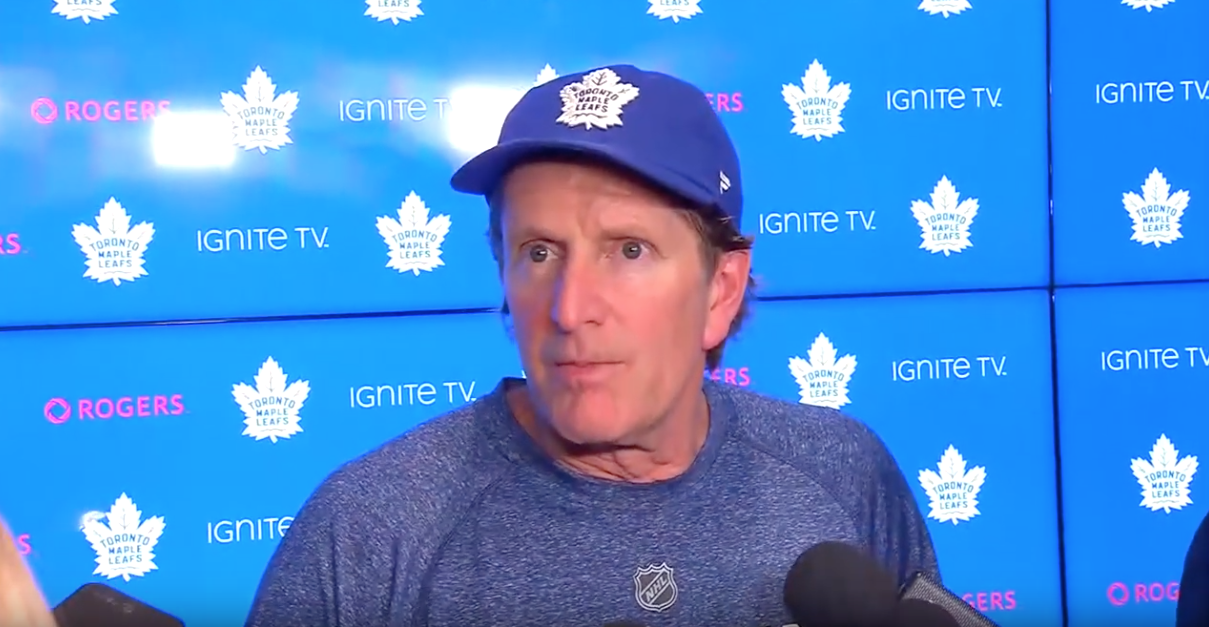Mike Babcock addressed the media after practice on Wednesday, discussing the injury status of Frederik Andersen, Garret Sparks’ adjustment to the NHL backup role, and the next-generation game against Minnesota on Thursday afternoon.
When you look at the balance of your club, how important has that been in managing the minutes right from front to back as you proceed in the season toward the Spring?
Babcock: We like to do that for sure. You look at a team like Tampa, who has got the ability to really play their lines, and that’s what we’d like to do, for sure. We think it is the best long-term. Sometimes, I don’t know if you notice, but in the games we lose, we overplay our guys because we are chasing the game. In the games that we win, we always get good minutes out of everybody because you’re not chasing the game. It is one of those things. Start on time, play everyone, make everyone important. Everyone on our team has an important job, whether it be power play or penalty kill, and we try to make everybody important. In the end, I think that’s how you have team success.
Any update on Frederik Andersen?
Babcock: No update on Freddy. He didn’t practice with us today, so obviously, we are not going to see him tomorrow. And then we have a practice day in between. I don’t know if he can practice one day and come… Now, he’s practicing every day. He’s on the ice, he’s doing his thing, and he’s feeling pretty good. I don’t know… I don’t ask him. When they tell me, I’ll know.
How much better have you seen Sparks become since he was named the backup out of camp?
Babcock: I think the biggest thing is just composure. I thought he played and made a lot of good saves against the Islanders. I thought, when the fourth goal went in, he got rattled for a bit. There is no sense in getting rattled. There is no sense in getting wound up. It is the next shot. That’s what it is. Some days, it doesn’t go in. Some days, it does. You regroup and you get back at it.
To me, it is a process. The backup goalie position is a hard position mentally. You see a lot of veteran guys doing it. You don’t see as many kids doing it. There is a reason. It is mentally hard. He is getting an opportunity right now, though, to show what he has. I think that is what you are always hoping for. You are preparing in life for your opportunity and when you get your opportunity, you want to show that you are ready for that opportunity. That is the challenge. The hardest thing in pro sport is confidence, but you need it.
It is a different type of game tomorrow with the kids and the next-generation game. How important is it for you to plant that seed for a new generation of kids?
Babcock: To tell you the truth, I never really thought about that. It’s a two o’clock game, so breakfast is at a different time. We’ve got to play real well.
I think we do a real good job here in Toronto with our fan base and with kids and doing everything we can to sell the game. I think Mr. Tanenbaum is really into that, and it’s a special thing. I just know, from being involved in our national team and the World Juniors and all of that stuff, how big of a deal it is for Canada. The more grassroots hockey you can have… The only way you get good players is if you have grassroots hockey. Obviously, sharing in the community is so important.
I like a two o’clock game. I really like it on the road when you are coming home. We can’t seem to get that done very much around here, though. I don’t know. I’d like to have some two o’clock’ers on Saturday. I’m just putting in some shilling. Two o’clock’ers on Sunday. Anyway, what else do you guys want?
Does the process change much for an early start like that?
Babcock: I mean, obviously, for myself… You’d go home in between. You come in earlier. We did way more in prep today. We did way more preparing for Minny today in our practice than we would. What we’ll do is we’ll bring our guys in that need to eat. The kids that are in close can come in and eat and we’ll make sure we’ve got good meals for them. The guys that have got someone to do that for them, they don’t have to come in.

































